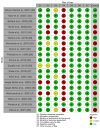A Systematic Review of the Effects of Low-Carbohydrate Diet on Athletic Physical Performance Parameters
- PMID: 40109832
- PMCID: PMC11922096
- DOI: 10.7759/cureus.79166
A Systematic Review of the Effects of Low-Carbohydrate Diet on Athletic Physical Performance Parameters
Abstract
A low-carbohydrate diet (LCD) or ketogenic diet is commonly used by individuals who want to achieve ketosis, which can boost fat metabolism, increase insulin sensitivity, and reduce blood sugar spikes. However, many athletes are hesitant to utilize a diet that specifically restricts the intake of carbohydrates, an important source of energy for physical activity. Athletes usually adopt a high-carbohydrate or high-protein diet, depending on their goals. This review aims to examine the evidence for the impact of an LCD on athletes' aerobic, anaerobic, and upper and lower body strength performance. A systematic review of original studies was conducted for articles indexed in PubMed that utilized an LCD in athletes and reported athletic performance values. A total of 19 studies were included in the final synthesis. An LCD may aid in maintaining or increasing upper and lower body strength. However, this type of diet provides no consistent benefit and may even negatively impact some measures of aerobic and anaerobic performance. Taken together, no strong evidence indicates the benefit of an LCD on athletic performance. Athletes wishing to modify their diet for improved performance should consider possible diets with specific training and performance goals in mind.
Keywords: aerobic performance; athletic performance; ketogenic diet; low-carbohydrate high-fat diet; lower body strength; strength.
Copyright © 2025, Sultan et al.
Conflict of interest statement
Conflicts of interest: In compliance with the ICMJE uniform disclosure form, all authors declare the following: Payment/services info: All authors have declared that no financial support was received from any organization for the submitted work. Financial relationships: All authors have declared that they have no financial relationships at present or within the previous three years with any organizations that might have an interest in the submitted work. Other relationships: All authors have declared that there are no other relationships or activities that could appear to have influenced the submitted work.
Figures


References
-
- American college of sports medicine position stand. Nutrition and athletic performance. Rodriguez NR, Di Marco NM, Langley S. Med Sci Sports Exerc. 2009;41:709–731. - PubMed
-
- Effect of carbohydrate ingestion during exercise on post-exercise substrate oxidation and energy intake. Melby CL, Osterberg KL, Resch A, Davy B, Johnson S, Davy K. Int J Sport Nutr Exerc Metab. 2002;12:294–309. - PubMed
Publication types
LinkOut - more resources
Full Text Sources
